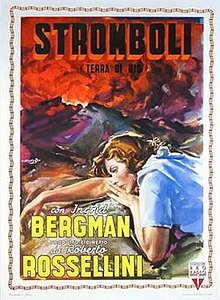
Roberto Gastone Zeffiro Rossellini was an Italian film director, screenwriter and producer. He was one of the most prominent directors of the Italian neorealist cinema, contributing to the movement with films such as Rome, Open City (1945), Paisan (1946), and Germany, Year Zero (1948). He is also known for his films starring Ingrid Bergman, Stromboli (1950), Europe '51 (1952), Journey to Italy (1954), Fear (1954), and Joan of Arc at the Stake (1954).

Ingrid Bergman was a Swedish actress. With a career spanning five decades, Bergman is often regarded as one of the most influential screen figures in cinematic history. She won numerous accolades, including three Academy Awards, two Primetime Emmy Awards, a Tony Award, four Golden Globe Awards, BAFTA Award and a Volpi Cup. She is one of only four actresses to have received at least three acting Academy Awards. In 1999, the American Film Institute recognised Bergman as the fourth greatest female screen legend of Classic Hollywood Cinema.

Italian neorealism, also known as the Golden Age, was a national film movement characterized by stories set amongst the poor and the working class. They are filmed on location, frequently with non-professional actors. They primarily address the difficult economic and moral conditions of post-World War II Italy, representing changes in the Italian psyche and conditions of everyday life, including poverty, oppression, injustice and desperation.

Isabella Fiorella Elettra Giovanna Rossellini is an Italian actress and model. The daughter of Swedish actress Ingrid Bergman and Italian film director Roberto Rossellini, she is noted for her successful tenure as a Lancôme model and an established career in American cinema.

Anna Maria Magnani was an Italian actress. She was known for her explosive acting and earthy, realistic portrayals of characters.

Stromboli is an island in the Tyrrhenian Sea, off the north coast of Sicily, containing Mount Stromboli, one of the four active volcanoes in Italy. It is one of the seven Aeolian Islands, a volcanic arc north of Sicily. Strabo writes that people believed that this is where Aeolus lived.
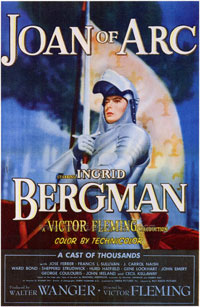
Joan of Arc is a 1948 American hagiographic epic film directed by Victor Fleming, and starring Ingrid Bergman as the eponymous French religious icon and war heroine. It was produced by Walter Wanger and is based on Maxwell Anderson's successful Broadway play Joan of Lorraine, which also starred Bergman, and was adapted for the screen by Anderson himself, in collaboration with Andrew Solt. It is the only film of an Anderson play for which the author wrote the film script. It is the last film Fleming directed before his death in 1949.

Rome, Open City, also released as Open City, is a 1945 Italian neorealist war drama film directed by Roberto Rossellini and co-written by Sergio Amidei, Celeste Negarville and Federico Fellini. Set in Rome in 1944, the film follows a diverse group of characters coping under the Nazi occupation, and centers on a Resistance fighter trying to escape the city with the help of a Catholic priest. The title refers to the status of Rome as an open city following its declaration as such on 14 August 1943. The film is the first in Rosselini's "Neorealist Trilogy", followed by Paisan (1946) and Germany, Year Zero (1948).
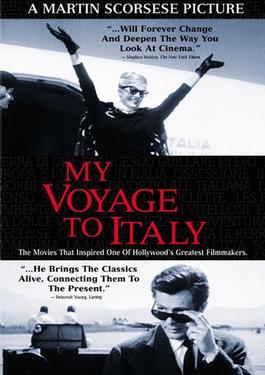
My Voyage to Italy is a personal documentary by acclaimed Italian-American director Martin Scorsese. The film is a voyage through Italian cinema history, marking influential films for Scorsese and particularly covering the Italian neorealism period.
Friedel Pia Lindström is a Swedish television journalist, and the first child of actress Ingrid Bergman.
Stromboli is a volcanic island off the north coast of Sicily, Italy.

The Flowers of St. Francis is a 1950 film directed by Roberto Rossellini and co-written by Federico Fellini. The film is based on two books, the 14th-century novel Fioretti di San Francesco and La Vita di Frate Ginepro, both of which relate the life and work of St. Francis and the early Franciscans. I Fioretti is composed of 78 small chapters. The novel as a whole is less biographical and is instead more focused on relating tales of the life of St. Francis and his followers. The movie follows the same premise, though rather than relating all 78 chapters, it focuses instead on nine of them. Each chapter is composed in the style of a parable, and, like parables, contains a moral theme. Every new scene transitions with a chapter marker, a device that directly relates the film to the novel. When the movie initially debuted in America, where the novel was much less known, on October 6, 1952, the chapter markers were removed.

Europe '51, also known as The Greatest Love, is a 1952 Italian neorealist film directed by Roberto Rossellini, starring Ingrid Bergman and Alexander Knox. The film follows an industrialist's wife who, after the death of her young son, turns towards a rigorous humanitarianism. In 2008, the film was included on the Italian Ministry of Cultural Heritage’s 100 Italian films to be saved, a list of 100 films that "have changed the collective memory of the country between 1942 and 1978."

Paisan is a 1946 Italian neorealist war drama film directed by Roberto Rossellini. In six independent episodes, it tells of the Liberation of Italy by the Allied forces during the late stage of World War II. The film premiered at the Venice International Film Festival and received numerous national and international prizes.

Ingrid Bergman was a multilingual, Academy Award-winning actress born in Stockholm, conversant in Swedish, German, English, Italian, and French. She had been preparing for an acting career all her life. After her mother Frieda died when she was three years old, she was raised by her father Justus Samuel Bergman, a professional photographer who encouraged her to pose and act in front of the camera. As a young woman, she was shy, taller than the average women of her generation, and somewhat overweight. Acting allowed her to transcend these constraints, enabling her to transform herself into a character. She first appeared as an uncredited extra in the film Landskamp (1932), and was accepted into the Royal Dramatic Theatre of Stockholm as a scholarship student in 1933.
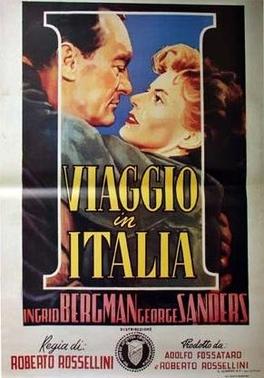
Journey to Italy, also known as Voyage to Italy, is a 1954 drama film directed by Roberto Rossellini. Ingrid Bergman and George Sanders play Katherine and Alex Joyce, a childless English married couple on a trip to Italy whose marriage is on the point of collapse until they are miraculously reconciled. The film was written by Rossellini and Vitaliano Brancati, but is loosely based on the 1934 novel Duo by Colette. Although the film was an Italian production, its dialogue was in English. The first theatrical release was in Italy under the title Viaggio in Italia; the dialogue had been dubbed into Italian.
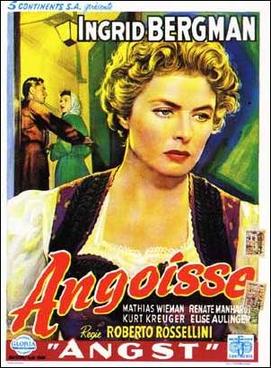
Fear is a 1954 German-Italian drama film directed by Roberto Rossellini and starring his wife Ingrid Bergman. It is loosely based on the Stefan Zweig novella Fear. Rossellini created it because he wanted to explore the reconstruction of Germany from both a material and moral standpoint ten years after making his previous German film Germany, Year Zero. The film is noirish with aspects reminiscent of Hitchcock and German Expressionism.
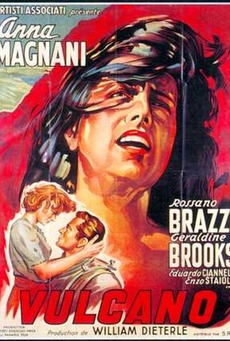
Volcano is a 1950 Italian drama film directed by William Dieterle and starring Anna Magnani, Rossano Brazzi, and Geraldine Brooks. It was filmed on location on Salina Island, in the Aeolian Islands, and in the city of Messina on Sicily.
The War of the Volcanoes is a 2012 documentary film directed by Francesco Patierno detailing the filming of Roberto Rossellini's 1950 film Stromboli starring Ingrid Bergman and the 1950 film Volcano starring Anna Magnani.
Mario Vitale (1923–2003) was an Italian film actor. Vitale was a fisherman chosen by Roberto Rossellini to star alongside Ingrid Bergman in the 1950 film Stromboli. He played prominent roles in several other films until the mid-1950s.
